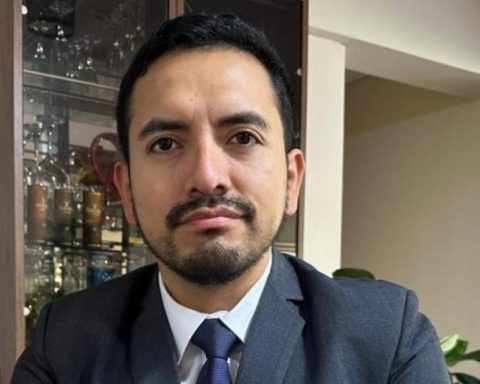Senator Francisco Huenchumilla (DC) decided to step out of the political context, less than three months before the exit plebiscite is held, and after Chile Vamos ratified, last Saturday, its strategy of rejecting the new Constitution , with the promise of projecting a hypothetical “Plan B” for after September 4. Established as one of the most experienced figures in Congress, at 78 years old, the Falangist from Temuco assumes that he has the responsibility to raise his voice to expose the true intentions that are hidden behind the story of the right, where -a In his opinion, there is a risk that some sectors of the center-left will join such a strategy, which it supposedly seeks to reject in order to seek a new constituent process in the future.
The parliamentarian reaffirms his vision set out in a public statement released this weekend, with the aim of demystifying what, according to his vision, is a “Rejection wrapped in couché paper” and that it is a “covert operation” to protect the political, but above all economic, basis of the 1980 Constitution. A maneuver that he hopes will not have the support of some personalities of the center-left or former Concertación, on which, although he did not want to specify, he indicated that “it is enough to see some statements in the press, to know who they are”.
Ensuring that his position allows him to observe the political scenario with greater calm and critical judgment, since he assumes that his public work is already completing its last cycle, Huenchumilla considers that in the constituent process “the form won over the content”, creating a environment favorable to the Rejection and that, in his opinion, is largely the responsibility of some conventionalists and their refoundational discourse, which was detrimental to the Approval project.
-Why do you decide to speak at this time and what are your motivations for doing so? Do you think that a voice like yours can contribute to the Approval campaign?
-It seemed appropriate to me to say something about it, without pretending that a single statement of mine could change the scenario, but I felt that I had the obligation to say something that I had foreseen and, therefore, I think that this is a Rejection disguised as couché paper, under which the design of rejecting is hidden to generate a political scenario in which the right once again regains the veto power that it lost in the Convention, where it did not reach a third of the constituents, which was fatal for its political objectives. On the other hand, winning the Rejection, a new scenario is generated again, we return to page zero, where the right wing regains its veto power, which today it has intact in Congress, which gives it a new opportunity to continue with its purposes.
Having recovered that veto power, the question I ask myself is: why do I have to believe this story from the right that now it is going to be available to change the Constitution? Considering that it is something that has never been done in the last 30 years and, furthermore, because I believe that the central core of the objective of the right is to maintain the economic, social and political model, which means the economic neoliberal model, which is in the central nerve of this matter.
-What do you think is the background of this strategy deployed by the right? Do you think it is a plan that seeks to add the support of other sectors, including some leaders of the left?
-We are entering right-wing land in this process, and I believe that the political right and the economic right as a whole, began a design aimed at presenting Rejection in a much more friendly way, seeing how this option was gaining ground in the polls and This was echoed by many sectors, including center-left sectors and, therefore, there was a feeling that what was winning was the process and not the content of the Constitution. And that this process would have generated discomfort or uncertainty in public opinion, fostering a climate favorable to Rejection. In that aspect, the right and the economic sectors, in a very clever way, created this notion of ‘Plan B’, in the scenario that this option is imposed in the exit plebiscite. However, it is not the typical strategic scenario that can be deployed, saying what am I going to do in case scenario A or scenario B happens, but rather an alternative is chosen, but trying to generate a design that would allow this Rejection to be sold to all citizens, with a friendly face. That is, it aims to tell people not to be afraid to reject, because the changes are going to be made anyway.
-You mention sectors of the center-left that could eventually join this idea of rejecting to project a ‘Plan B’. What parties or groups are you referring to? Are they part of Democratic Socialism?
-I would not say that there are groups involved in this, but there are certain personalities who have positions of authority, on the right and also on the center-left, in addition to conventional ones from some sectors originally linked to the I approve option, who have also been demolishing this process and, at the same time, generating an analysis of some contents of the draft where an ideological prejudice is denoted and, in some cases, an ignorance of many issues in this regard. And, then, that’s why that climate was created in the country. And I, being critical of the form, believe that we are experiencing a historic opportunity where we cannot have a simply prejudiced attitude and throw everything in the garbage can. I believe that whatever the scenario, whether now or after September 4, it will require a great effort from the entire political world to continue walking in stability, development and governability.
-Could you point out who are those center-left political figures you are referring to?
-It would not be appropriate for me to specify who they are, but it is enough to read the press and their statements, regarding many senators and deputies who are center-left but who agree with that critical position of the new Constitution. It seems inconceivable to me that there could be sectors of the center-left that were in a joint campaign with the right. I understand that there could be people from the center-left who voted for Rejection, I understand it perfectly, but it would not seem to me that there were some who would join a campaign to wrap Rejection in couché paper. I am from the old politics, I do not buy those stories.
Criticism of the constituent process
The senator for the Region of La Araucanía vehemently points out that the center-left should not, in any case, agree with the proposal of Chile Vamos, reiterating its commitment to the Approval in the Exit Plebiscite on September 4. However, Huenchumilla is clear in evidencing his criticism of the constituent process, where he believes that the refoundational logic and a strategy of doing politics “in a different way”, by some conventional members of the Approval List, was unfavorable and had repercussions in the lowering of in the polls and, in turn, that support for the Rejection option was increasing.
-What do you think about the Convention and its work in recent months? What do you think are the political responsibilities of the process losing some legitimacy?
-That is behind my statement, because I believe that someone can legitimately vote Approve or Reject, based on the merit of the content of the Constitution, although I must recognize that, in the constituent process, the form won over the content, because of the way in which the constituents – new political actors, of different identities, who had not traditionally been involved in state affairs – approached this decisive process. This created a favorable environment so that people did not see the process with good eyes, which did not reveal the content of the new Constitution. This generated this context so that, intelligently, the economic and political right wing generated this story, after they sought a third option through a constitutional reform, which finally had no floor, which forces them to opt for this formula of seek a new political alternative based on Rejection.
-Do you point out, then, some conventional ones such as those responsible for the I approve option losing citizen support? How do you explain this idea that form won over content?
-I believe that what happened in Chile is that a political and social environment unfavorable to Approval and favorable to Rejection was generated, due to the way in which the conventional ones behaved from the personal and political point of view, where since the beginning this process, on the day of installation, a staging with obvious errors was generated, which was permanently deepened over time. This generated a climate that the country did not like, where citizens were accustomed to a traditional political class, which many wanted to change, but which did not see positively this irruption of new leaderships that brought with them a new way of carrying out their work, from the the day they were established. In my opinion, the form won over the content and the idea was generated that nothing good could emerge from the way in which the conventional ones worked, from the things they said and from the arrogance linked to a refounding discourse that, in my opinion, it was a mistake to deploy. I believe that the form generated a negative psychosocial environment, to which many people joined, and for which the surveys were so lapidary, and where the Rejection was adding support.
-Finally, what do you think the hypothetical scenarios would be, the day after the exit plebiscite? In this regard, what is your call to the political class today?
-I can’t imagine a scenario winning the Rejection, with a young government that promised changes to the country, and that the citizens tell him, after giving him 80%, that he rejects his project. So, in this hypothetical scenario, the right is obviously going to recover its veto power, seeking to do things again in a similar way to the policy of the agreements of past years, in which Jaime Guzmán said that whatever the circumstances, ‘our adversaries they wouldn’t do anything other than what they themselves would do’. On the contrary, if the Approval wins, we are going to have to make a tremendous legal architecture, with all the changes that have been proposed, which requires a lot of legislation, a lot of gradualism and a lot of wisdom of the Transitory Norms, and a lot of objectivity on the part of those who they are working on it.
I believe that those who think that all public law will govern currentlywould be a serious political error. That is why my call is for political reflection, when I am a senator who is retiring and I do not aspire to any popularly elected position or anything, because I have already completed a cycle in my life, and that is why I can look at the things more calmly.

















